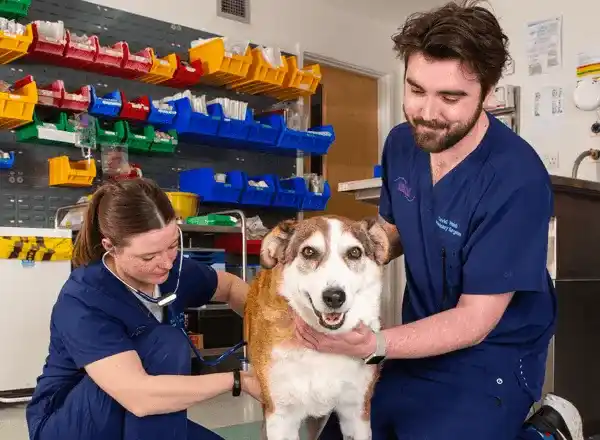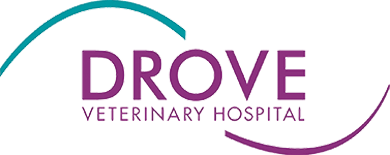Advanced services at Drove Veterinary Hospital
We like to say that we’re big enough to handle anything unexpected and small enough to know you and your family by name – and a big reason for this is the fantastic facilities we enjoy at our main hospital.
Our hospital both caters for locals in the heart of Swindon and takes internal referrals for more complex procedures, ensuring that every one of our clients benefits from our expertise, facilities and equipment.
Let’s have a look at some of the advanced services we’re able to offer our patients from our hospital.

Arthroscopy and laparoscopy
Arthroscopy is a procedure used to look inside a joint, using a thin telescope with a light source, called an arthroscope, which is passed through a small cut in the skin and into a joint.
Arthroscopy may be done to investigate symptoms such as pain, swelling, or instability of a joint. It can show damage to cartilage or ligaments within a joint, fragments of bone or cartilage which have broken off, or signs of arthritis.
In addition to simply looking inside, we can use fine instruments in the joint to do a variety of procedures easily and safely, known as keyhole surgery, or laparoscopy.
Chemotherapy
Chemotherapy can be an excellent treatment option that can increase the life of your pet while still maintaining quality of life, compared with no treatment at all.
Chemotherapy drugs are designed to kill rapidly dividing cells, such as cancer cells.
Compared to people who receive chemotherapy, pet animals experience fewer and less severe side effects because we use lower doses of drugs.
Endoscopy
An endoscopy is a procedure where the inside of your pet’s body is examined internally using a thin,flexible tube that has a light source and a video camera at one end.
Images of the inside of the body are relayed to an external screen, allowing our team to see the internal structure without invasive surgery.
Neurology
Neurology involves the structure, functions and diseases of the nervous system – the brain, spinal cord, peripheral nerves and muscles they supply.
It combines the knowledge of medical and surgical fields to localise and treat specific neurological problems.
Common neurological conditions include the management of seizures and spinal conditions.
Ophthalmology
Ophthalmology involves the diagnosis and treatment of eye conditions. We can see a wide range of ophthalmology cases, including complex procedures, although some surgeries may need to be performed at another site due to the specialised equipment required.
Our team is led by Ida Gilbert, a highly experienced RCVS Advanced Practitioner in Veterinary Ophthalmology, with a distinguished career spanning over two decades.
Diagnostics
We have a wide range of imaging tools to allow us to provide accurate diagnoses as quickly as possible, and can suggest the most effective treatment options. This includes a CT scanner, x-rays, ultrasound and an extensive in-house lab.
Cardiology and respiratory
We can investigate all types of heart and lung disease – and new treatments available for heart conditions in pets can ensure that your pet can now live a happy life for years after diagnosis.
Signs of these conditions can include general lethargy, loss of appetite or weight, coughing and fainting.
If an abnormality is detected on examination of your pet, further tests may be suggested, such as:
- Blood tests
- Blood pressure monitoring
- Imaging using x-rays or ECG
- Endoscopy
- Blood gas monitoring
A combination of some of the above tests may be used to discover any underlying diseases to give the most accurate diagnosis and assist in formulating the best treatment plan for your pet.
Dermatology
Dermatology involves the treatment of skin diseases. Skin problems are one of the most common reasons that clients bring their pets to see us.
Many symptoms are clearly visible and include pustules, scabs, rashes and hair loss. This makes it very easy to treat most causes of skin disease.
Lots of skin diseases present with similar symptoms and to achieve a diagnosis tests are often necessary. Common tests performed include skin scrapes, tape strips, swabs, biopsies and blood tests.
Internal medicine
Internal medicine involves the diagnosis and management of conditions of the internal organs.
We use investigative techniques as well as thorough clinical examination and the history of your pet to establish what your animal is suffering from and how best we can treat it.
Investigations may include blood tests, x-rays, ultrasound scans, endoscopy and various techniques for sampling body tissues.
Orthopaedics
In orthopaedics we deal with bones, joints and the muscles that move them.
We have thorough experience in dealing with major trauma injuries, joint surgery and growth abnormalities and treat injuries and fractures by means of internal and external fixation and arthroscopic surgery.
The first sign of orthopaedic problems may involve your pet becoming lame, or being in pain.
A detailed examination is always performed, which may be all that is required with simple injuries. However, a more detailed examination may be necessary.
Help is available during your pet’s recovery and your vet will be able to advise on appropriate long term therapy, physiotherapy, hydrotherapy and acupuncture.
Dentals
Dental issues are very common in pets, and can lead to pets having teeth removed as well as having implications for long term health as bacteria enters the blood stream and travels to the major organs. Lifetime Care Club members get 10% off dental treatments.
- Get in touch





